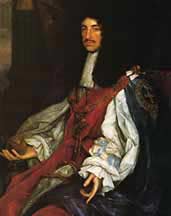 Charles II
Charles IIHouse of Stuart, Restored -- Reigned: 1660-1685 1630-1685
He drifted to Holland, but returned to Scotland in 1650 amid the Scottish proclamation of his kingship; in 1651, he led a Scottish force of 10,000 into a dismal defeat by Cromwell's forces at Worcester. He escaped, but remained a fugitive for six weeks until he engineered passage to France. Charles roamed Europe for eight years before being invited back to England as the Commonwealth dissolved. He married Catherine of Braganza, but sired no legitimate children. His oldest child, James Scott, Duke of Monmouth, made a failed bid to capture the crown at the time of his father's death and was executed by James II, brother of Charles II and Uncle to Monmouth. Charles II died in February 1685 from complications following a stroke. Charles arrived in London to claim the throne on his 30th birthday, May 29, 1660. He was extremely tolerant of those who had condemned his father to death: only nine of the conspirators were executed. He was also tolerant in religious matters, but more from political wisdom than overwhelming morality. England was overjoyed at having a monarch again. However, royal powers and privileges had been severely limited by Parliament. He was forced to fund his administration from customs taxes and a healthy pension paid to him by France's Louis XIV. Royal prerogative, the soul of the Tudor monarchs, James I and Charles I, had all but vanished. This moment was a turning point in English political history, as Parliament maintained a superior position to that of the king, and the modern concept of political parties formed from the ashes of the Cavaliers and Roundheads. The Cavaliers evolved into the Tory Party, royalists intent on preserving the king's authority over Parliament, while the Roundheads transformed into the Whig Party, men of property dedicated to expanding trade abroad and maintaining Parliament's supremacy in the political field. The first decade of Charles' reign was beset by many problems. Defeat at the hands of the Dutch in a mishandled war over foreign commerce cost him domestic support. The Great Plague of 1665 and the Fire of London in the following year left much of the city in ruins. In 1667, the Dutch sailed up the Medway, sunk five battleships and towed the Royal Charles back to Holland. King and Council were ridiculed for not having enough interest in the affairs of government. The 1670's saw Charles' forging a new alliance with France against the Dutch. French support was based on the promise that Charles would reintroduce Catholicism in England at a convenient time -- apparently, that convenient time never came, as Charles did nothing to bring England under the Catholic umbrella, although he made a deathbed conversion to the Roman faith. The Whigs used Catholicism to undermine Charles; England was in the throes of yet another wave of anti-Catholicism, with the Whigs employing this paranoia in an attempt to unseat the heir apparent, Charles' Catholic brother James, from succeeding to the throne. Titus Oates, a defrocked Anglican priest, stoked the fires of anti-Catholicism by accusing the queen and her favorites of attempting to murder Charles; ten men fell prey to false witness and Oates' manipulation of the anti-Catholic movement, and were executed. Many accused Anthony Cooper, Earl of Shaftsbury and founder of the Whig Party, of inciting the anti-Catholic violence of 1679-80; this has remained one of the greatest mysteries in British history. The Whig-dominated Parliament tried to push through an Exclusion Bill barring Catholics from holding public office (and keeping James Stuart from the throne), but Charles was struck down by a fever and opinion swayed to his side. His last years were occupied with securing his brother's claim to the throne and garnering Tory support. Charles' era is remembered as the time of "Merry Olde England". The monarchy, although limited in scope, was successfully restored -- the eleven years of Commonwealth were officially ignored as nothing more than an interregnum between the reign of Charles I and Charles II. Charles' tolerance was astounding considering the situation of England at the time of his ascension, but was necessary for his reign to stand a chance at success. He was intelligent and a patron of scientific research, but somewhat lazy as a ruler, choosing to wait until the last moment to make a decision. The British attitude towards Charles II is humorously revealed in this quote from the British satire, 1066 and All That:
|
All rights reserved. For details and contact information: See License Agreement, Copyright Notice. |
 Charles II, second son of Charles I and Henrietta Marie of France, was born in 1630. He spent his teenage years fighting Parliament's Roundhead forces until his father's execution in 1649, when he escaped to France.
Charles II, second son of Charles I and Henrietta Marie of France, was born in 1630. He spent his teenage years fighting Parliament's Roundhead forces until his father's execution in 1649, when he escaped to France.